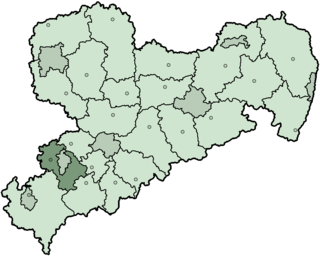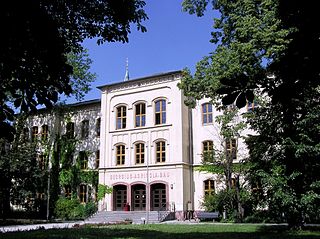Related Research Articles

August Horch was a German engineer and automobile pioneer, the founder of the manufacturing giant that eventually became Audi.

Zwickau is the fourth-largest city of Saxony, Germany, after Leipzig, Dresden and Chemnitz, with around 88,000 inhabitants,.

Zwickauer Land is a former Kreis (district) in the south-west of Saxony, Germany. Neighboring districts were Chemnitzer Land, Stollberg, Aue-Schwarzenberg, Vogtlandkreis, and the districts Greiz and Altenburger Land in Thuringia. The district-free city of Zwickau was located in the center of the district and nearly completely surrounded by it.

Auto UnionAG was an amalgamation of four German automobile manufacturers, founded in 1932 and established in 1936 in Chemnitz, Saxony. It is the immediate predecessor of Audi as it is known today.
The Zwickau prophets were three men of the Radical Reformation from Zwickau in the Electorate of Saxony in the Holy Roman Empire who were possibly involved in a disturbance in nearby Wittenberg and its evolving Reformation in early 1522.

Horch was a German car manufacturer, which traced its roots to several companies founded in the very late 19th and early 20th century by August Horch.

HQM Sachsenring GmbH is a Zwickau-based company that supplies chassis and body parts to the automotive industry. The company was named after the Sachsenring race track. Founded as VEB Sachsenring after the end of World War II, and operating out of the former Auto Union factory in Zwickau, Sachsenring was one of the few manufacturers of vehicles in East Germany, its best known product being the Trabant, produced between 1957 and 1991. Following the reunification of Germany in 1990, Sachsenring transitioned from a government-owned company under a centrally-planned economy to a private corporation in a free market economy.

FSV Zwickau is a German association football club located in Zwickau, Saxony. Today's club claims as part of its complex heritage sides that were East Germany's first champions: 1948 Ostzone winners SG Planitz and 1950 DDR-Oberliga champions ZSG Horch Zwickau.
The 1997–98 2. Bundesliga season was the twenty-fourth season of the 2. Bundesliga, the second tier of the German football league system.
Zwickau is a district (Kreis) in the Free State of Saxony, Germany.
Torsten Ziegner is a German former footballer who played as a midfielder.
The 1974–75 season saw the 24th competition for the FDGB-Pokal.

Zwickau Hauptbahnhof is the main railway station of Zwickau in the German state of Saxony.

The August Horch Museum Zwickau is an automobile museum in Zwickau, Saxony, Germany. Opened in 2004, it covers the history of automobile construction in Zwickau, the early history of Horch and Audi; their eventual incorporation into Auto Union in 1932, and ending with the company's relocation to Ingolstadt after World War II - from where the modern-day Audi company evolved.

The Zwickau tramway network is a network of tramways forming part of the public transport system in Zwickau, a city in the federal state of Saxony, Germany.

The Westsächsische Hochschule Zwickau - University of Applied Sciences Zwickau is a vocational university of about 3300 students located in Zwickau. Saxony, Germany. It offers Bachelor's, Master's and traditional German Diplom degrees in four core areas: Technology, Economics, Arts, and Life Sciences. The university also has further campuses in Markneukirchen, Reichenbach im Vogtland and Schneeberg.
The 2016–17 FSV Zwickau season was their first season in the 3. Liga, the third tier of German football.

Stadion Zwickau is a stadium in Zwickau, Germany. It is used as the home stadium of FSV Zwickau and has a capacity of 10,134 seats.
The Robert Schumann Prize of the City of Zwickau is a classical music award. Since 1964 it has been awarded by the Lord Mayor of Zwickau. Robert Schumann was born in Zwickau. Between 1964 and 2002 the prize was awarded annually, since 2003 biennially. The award is given to outstanding singers, instrumentalists and ensembles as well as musicologists and musical institutions, who have rendered special service (sic) to cherishing and presenting Schumann’s musical and literary heritage as well as to the knowledge of his life and works. The prize is endowed with a total of €10,000. The winners receive a certificate and a bronze medal with the portrait of Schumann, created by the sculptor Gerhard Lichtenfeld.
The Volkswagen Zwickau-Mosel Plant is an automobile factory in today's Zwickau district of Mosel, Germany. Founded on 26 September 1990, together with the Chemnitz plant and the Transparent Factory, it belongs to Volkswagen Sachsen, based in Zwickau. Currently, the Zwickau plant has about 8,000 employees. Signalling a milestone the last combustion vehicle was produced on 26 June 2020.
References
- ↑ Boyd, Malcolm. Oxford Composer Companions: J.S. Bach, Oxford University Press, 1999, p. 468